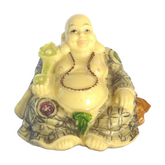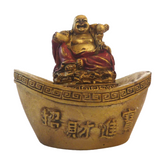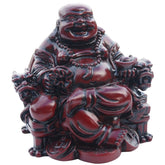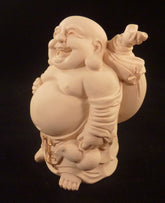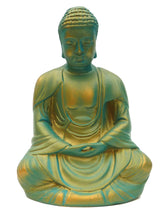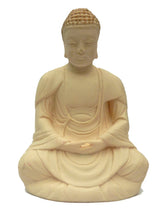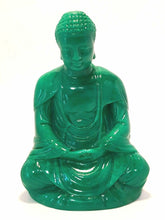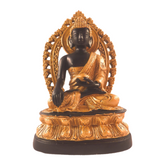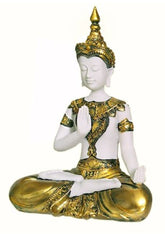Buddhism
Buddhism’s teachings eschew the notion of an omnipotent god or gods. There is no divine ruler who decides the fate of the individual. In Buddhism, life is not a series of free choices, but rather each person’s life is controlled by the karma he or she accumulated in previous lives. It is solely the action of the individual that determines the course of his or her life, and no god can change the effects once humankind has created the causes. Evil conduct cannot be forgiven and must reap its own punishment, while righteous deeds will reap their due rewards.
Buddhists believe that the fortunate, rich, or powerful obtain their status from a position of superior karma, while the poor and suffering have been cursed with their fate as a result of indiscretions in a previous existence. A person who is rich, powerful, or influential is obviously so because of a meritorious past life. His superior karma earns him the right and privilege of deference.
Fundamental to Buddhism is the belief in the Four Noble Truths, discovered by the Buddha at the moment of his enlightenment:
- all life is suffering
- all suffering has a cause in cravings or desire
- the suffering can be overcome by eliminating the desire
- the desire can be overcome by following the Eightfold Path
This eight-step recipe for success includes right view, right intention, right speech, right action, right livelihood, right mindfulness, and right concentration. The first two principles of the Eightfold Path concern motivation, the next three address moral code, and the last three concern man’s mind for right ends. Salvation occurs when the individual recognizes these eight truths and follows their guidelines to destroy desire, thereby breaking the train of reincarnation. The end result is enlightenment and entrance into a state of nirvana—the ultimate aim.
This Eightfold Path is also known as the Middle Way, as it avoids extremes of behavior. An adherent does not have to live an austere life, nor should he or she move to the high-end scale of sensuality.
As a result of their belief in karma and reincarnation, Buddhists refuse to assign moral shame to the actions of an individual. Life is nonjudgmental, and Buddhists neither fear nor look forward to an eternity in heaven or hell. Thus most Buddhists feel free to behave without guilt, as judgment in their next life will be based on their actions and not on religious dogma.
Buddhism, unlike Christianity, refuses to answer many of the basic questions about the meaning of life, such as human origins or final disposition. Life is seen as an impermanent condition filled with contradictory forces that demand no explanation and which are experienced with little attempt at rationalization. Buddhists are largely left alone to determine their own value systems and levels of morality.
To speed their path to nirvana by reducing their number of rebirths, Buddhists will make merit by feeding monks, giving donations to temples, and making regular appearances at temples for worship. Making merit is an intrinsic part of Buddhist social behavior.
Buddhists do not keep any particular dav of the week for religious observation in the way that followers of Christianity, Islam, or Judaism do. Nor do they celebrate mass or any other type of liturgy presided over by a priest or other religious leader, although they attend discourses of Buddhism given by abbots and will often seek counsel with a monk or nun to discuss life’s problems.
-
Vendor:Salt Co
All Knowing Buddha Wall Hanging
Beautiful hand made All Knowing Buddha wall hanging airbrushed in vibrant colors. Can be hung up in a room on the wall or simply used as a massage table covers for your healing rooms. Measures 200cm x 120cm in size.- $39.95 USD
- $39.95 USD
- Unit price
- per
-
Vendor:Anjian Australia
Buddha Vairochana Gift Card and Envelope
Buddha Vairochana Gift Card Hand made organic paper gift card with envelope. Hand Made in Nepal- $3.95 USD
$5.95 USD- $3.95 USD
- Unit price
- per
-
Vendor:Anjian Australia
Buddha with Ivory Jade Finish
The Buddha deity is considered by the Chinese as one of the most important Feng Shui symbols to keep in the home. The symbol itself alway brings a smile to one's own face. When placed in the home, the laughing Buddha brings a sense...- $7.95 USD
$12.95 USD- $7.95 USD
- Unit price
- per
-
Vendor:Dynamoh House
Buddhism Mini Chart
Learn about Buddhism the easy way with the Buddhism Mini Chart. Buddhism is a religion that was founded by Buddha and originated in India which later spread throughout Asia and worldwide. Buddhism teaches that Enlightenment can be achieved through political, religious and educational doctrine...- $9.95 USD
$11.95 USD- $9.95 USD
- Unit price
- per
-
Vendor:Dynamoh House
Buddhist Concepts Mini Chart
A beautifully illustrated Mini Chart that provides an interesting and instructive overview of Buddhist concepts. The chart is richly illustrated and is protection coated on both sides. The chart measures 9.25 x 6.25" (235 x 160mm) in size. Note: The low resolution image shown...- $9.95 USD
$11.95 USD- $9.95 USD
- Unit price
- per
-
Vendor:Anjian Australia
Eight Auspicious Symbols of Buddhism Gift Card and Envelope
Eight Auspicious Symbols of Buddhism Gift Card Hand made organic paper gift card with envelope. Hand Made in Nepal- $3.95 USD
$5.95 USD- $3.95 USD
- Unit price
- per
-
Vendor:Anjian Australia
Happy Buddha Trinket Box
Store your prized possessions or your secret wishes in the Happy Buddha Trinket box. Write down your wishes on a piece of paper and place it in the hidden compartment. Rub the belly of Buddha to enhance your chances for your wishes to materialize....- $6.95 USD
$12.95 USD- $6.95 USD
- Unit price
- per
-
Vendor:Anjian Australia
Laughing Buddha Sitting on a Chair
Rub the Buddha's belly to bring happiness and good fortune. Fill your life with Buddha Joy and Happiness! The Buddha deity is considered by the Chinese as one of the most important Feng Shui symbols to keep in the home. The symbol itself alway...- $14.95 USD
- $14.95 USD
- Unit price
- per
-
Vendor:Natures Energies
Laughing Buddha Standing
Laughing Buddha (Maitreya Buddha) Rub the Buddha's belly to bring happiness and good fortune. He is a symbol of happiness, wealth and an innocent contented joy. Buddha's belly is said to signify bountiful wealth and prosperity, by stroking it it is believed to bring much luck.The...- $12.95 USD
- $12.95 USD
- Unit price
- per
-
Vendor:Natures Energies
Marici Symbol Goddess of the Sun (Buddhism)
Goddess of the Sun. Traveller’s Protection. Marici rides a throne/chariot drawn along by seven boars. Glorious One. Sun of Happiness. In Mahayana and Vajrayana Buddhism, Marici is a deva or bodhisattva associated with light and the sun. Material Color Dimension (in/cm) Weight (oz/g) Tough...- $6.95 USD
- $6.95 USD
- Unit price
- per
-
Meditating Buddha Statue - Green/Gold
Meditating Buddha in Green/Gold Finish (made from resin and crushed stone composite) "Meditation" 98mm Tall Ornament Gift Boxed Mediating BuddhaInner Calmness & Compassion Constructive Thought The Buddha taught that the way to Enlightenmentis through meditation. Inner calmness, compassion,clarity of thought and action can be achieved througha simple method of...- $16.95 USD
$24.95 USD- $16.95 USD
- Unit price
- per
-
Meditating Buddha Statue - Ivory
Meditating Buddha in Ivory Finish (made from resin and crushed stone composite) "Meditation" 98mm Tall Ornament Gift Boxed Meditating BuddhaInner Calmness & Compassion Constructive Thought The Buddha taught that the way to Enlightenmentis through meditation. Inner calmness, compassion,clarity of thought and action can be achieved througha simple method of...- $16.95 USD
$24.95 USD- $16.95 USD
- Unit price
- per
-
Meditating Buddha Statue - Jade
Meditating Buddha in Jade Finish (made from resin and crushed stone composite) "Meditation" 98mm/4in Tall Ornament Gift Boxed Mediating BuddhaInner Calmness & Compassion Constructive Thought The Buddha taught that the way to Enlightenmentis through meditation. Inner calmness, compassion,clarity of thought and action can be achieved througha simple method...- $16.95 USD
$24.95 USD- $16.95 USD
- Unit price
- per
-
Vendor:Natures Energies
Quan Yin Brass Metal Protective Bell with Buddha Weight
The Quan Yin Brass Metal Bell is Protective, as it is embedded with the symbol of Quan Yin, the goddess of compassion. It also features Buddha as a weight hanging from the bottom of the bell. The bell produces a nice metallic sound that...- $9.95 USD
- $9.95 USD
- Unit price
- per
-
Vendor:Anjian Australia
Ratna Sambhava Buddha Gift Card and Envelope
Ratna Sambhava Buddha Gift Card Sambhava Buddha represents the cosmic element of form (rupa). Hand made organic paper gift card with envelope. Hand Made in Nepal- $3.95 USD
$5.95 USD- $3.95 USD
- Unit price
- per
-
Vendor:Anjian Australia
Shakyamuni Buddha Brass Statue
Guatama Buddha was born 563 b.c. in north-east India. He was the son of the King of the Sakyas, Suddhodana. Buddha’s mother was Queen Maya. When he left the palace and entered the life of an ascetic, he became known as Shakyamuni (Sakyamuni). Description...- $34.95 USD
$39.95 USD- $34.95 USD
- Unit price
- per
-
Vendor:Anjian Australia
Thai Buddha Statue
Enhance your home with this graceful Thai Buddha Statue symbol of peace and harmony. Statue is in meditating pose. This statue is 8 inches tall x 6 inches wide and made in polystone material. Statue color is white with golden robe and crown.- $19.95 USD
$22.95 USD- $19.95 USD
- Unit price
- per



